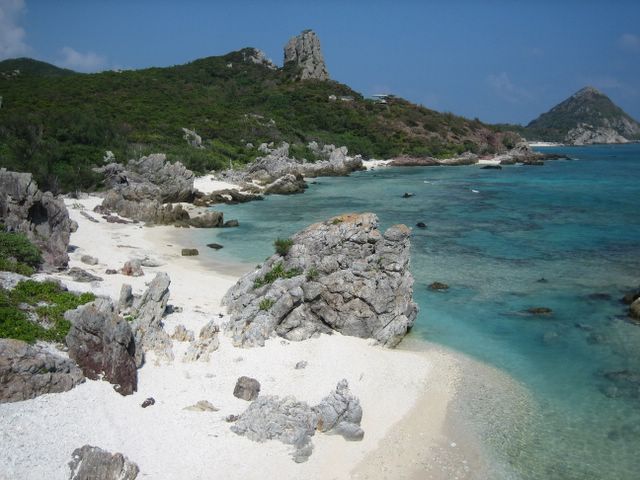 Teraryo, their eyes amuse me, I think they look quite startled to have been taken out of the water.
Teraryo, their eyes amuse me, I think they look quite startled to have been taken out of the water.

This Saturday (the 18th) I lived the day in the life of a mozuku fisher man on Izena Island. Mozuku is a brown sea weed which is something of a delicacy in Japan, it and sugar are Izena island’s main exports. My friend Koshin and his father are mozuku fishermen and two weeks ago Koshin had offered to give me a ‘workshop’ on his work. The day started early (I woke up at 6.30am) and we were in their boat heading out so sea by 8am. It was a small 25 to 30 foot boat, Koshin and his father work together in a two man team harvesting the mozuku. At the South West side of the island (off Izena beach) a small uninhabited island (Yamaho shima) and several rocks linked by reef form a large, shallow lagoon; this is where the mozuku is grown. It is grown on nets suspended about a foot above the sea bed. Once we had reached their nets we anchored the boat and set about harvesting the mozuku. There were several other similar small boats in the lagoon also harvesting mozuku, Koshin tells me there are about 50 fishermen (uminchu) in Izena village. It was a two man job, one member would dive down with a sort of hoover and suck up the mozuku. The mozuku and sea water was pumped up to the boat and then out over netting suspended over the side of the boat, the other member of the team would then brush the mozuku into crates while removing any other seaweeds or sea grass which was mixed in with the mozuku. I offered to help with the brushing and Koshin’s father seemed only too happy to let me, I ended up doing 6 out of the 7 crates we filled that day. I was determined to prove (to myself?) that I was up to the challenge of this work and I expect Koshin’s father was delighted to have a bit of a holiday. The mozuku fisher men work seven days and week and typically spend all day out at sea, hard work! I also went down and snorkeled to observe the ‘hoovering’ process. While I was down there I saw a white moray eel swimming along, it was perhaps 3 or 4 foot long. We harvested the mozuku without break until about 1.30pm when the compressor broke and Koshin was forced to surface. So that brought an end to the mozuku harvest for the day and to be honest I was quite relieved! We brought the mozuku to the packing plant and then had a quick lunch (bento) before heading back out to sea to do some shell fish collecting. For the record 400kg of mozuku brings in 7 man (350quid) and each crate weighted about 70kg, judging by the number of empty crates on the boat I think they would be able to fill 15-20 in a day. By now the lagoon was about 1 meter deep, perfect for collecting shell fish. A type of cone shell called teraryo is in season right now so that was our chosen prey. Now you those not in Okinawa may not be aware but cone shells can be very dangerous as certain species are extremely venomous (potentially fatal) and one is recommended to avoid all cone shells. So my first lesson was how to recognize the different species. Fortunately the most common species is the edible variety and the venomous species have a distinct pattern (triangular blobs instead of stripes) and are conveniently bright orange or purple. We collected toritsu from roughly 2.30 to 4.30 and after a while I got my eye in and collected quite a few, all together we must have collected several hundred at least. I also spotted some weird and wonderful marine life along the way, I have jotted down descriptions of them and will endeavor to find out what they were. Once back on dry land we boiled the shells and shelled them, quite a task as well! We split the teraryo equally three ways so now I have quite a lot of them in my fridge! Later I and Koshin met with Teru at Nakagawakan (the restaurant/hotel near my house) for dinner and drinks. I was pretty exhausted from the day’s exertions and had to pass on karaoke, I think I was sound asleep by about 11 o’clock. So that was my day in the life as an Izena mozuku fisherman, it was hard work and to be honest rather monotonous, it makes me even more grateful for the wonderful job I have now. I am very grateful to all those factors which have conspired to give me an education and therefore such exiting prospects and opportunities in life.

